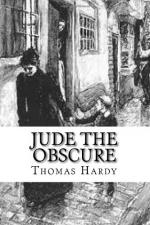|
This section contains 7,483 words (approx. 25 pages at 300 words per page) |

|
SOURCE: "Jude the Obscure As a Tragedy", in Southern Review, Vol. 6, 1940-41, pp. 193-213.
In the following essay, Mizener argues that Jude the Obscure is not a tragedy in the sense that it represents the contrast between the ideal life and the "permanently squalid real life of man," but rather a "history of a worthy man's education."
… who cannot see
What Earth's ingrained conditions are.
—"Seventy-four and Twenty."
I suppose no one will question Hardy's right to the title of "the first great tragedian in novel form," taking tragedy in its looser sense. Yet there seems to be a general feeling that somehow his novels are not successful, are not, for all their deep sense of the horror of ordinary life, really tragic. "There is," as Mr. E. M. Forster says, "some vital problem that has not been answered, or even posed, in the misfortunes of Jude the...
|
This section contains 7,483 words (approx. 25 pages at 300 words per page) |

|


